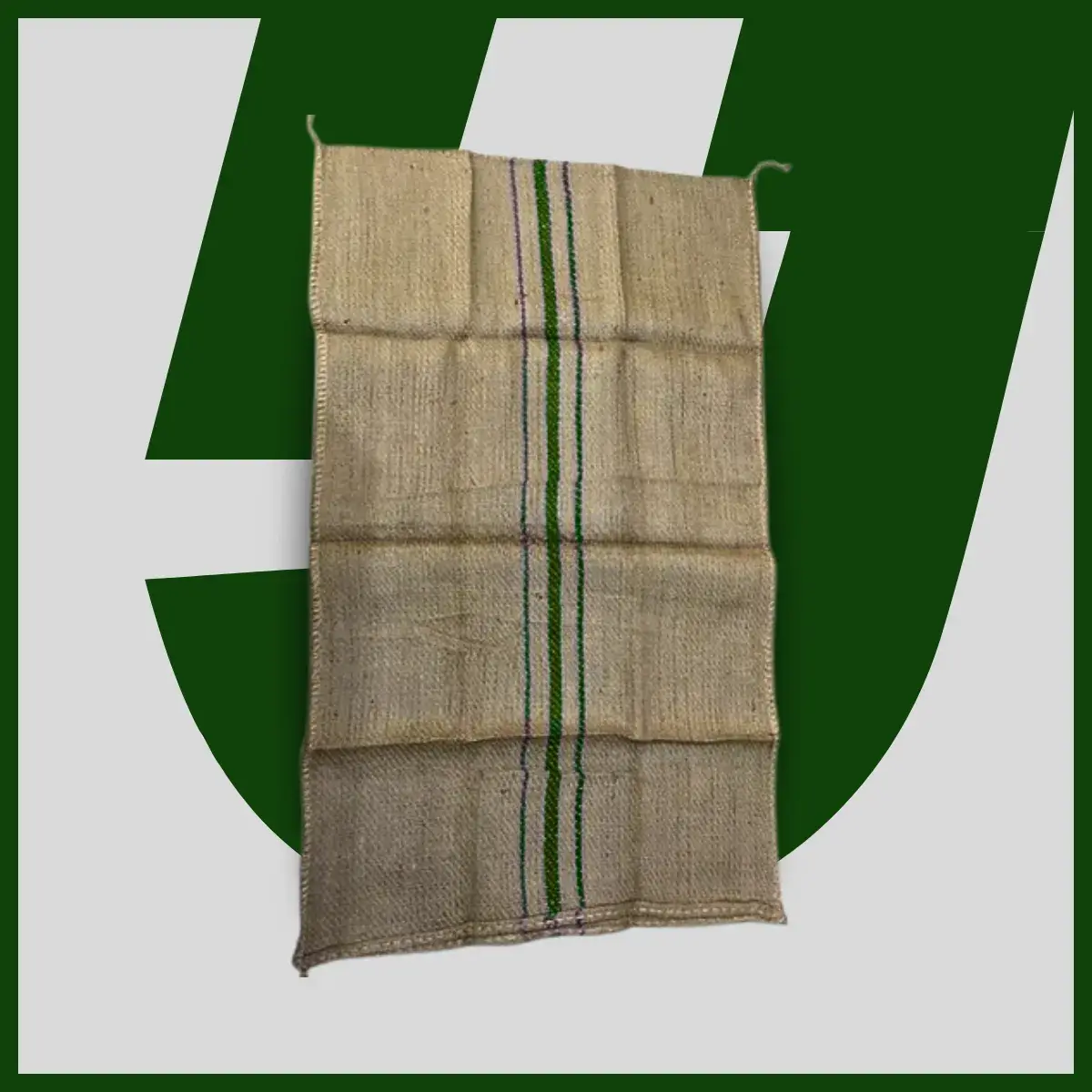
Standard Binola Jute Bag
- Heavy-duty sacking bags made from high-density jute fiber.
- Available in two sizes: 112×68 cm and 110×75 cm.
- Features Heracles stitch, mouth hemmed, and triple blue stripe design.
- Supplied exclusively in bulk (300 bags/bale), export-grade bale packed
Specification Details of Standard Binola Jute Bag
-
Quality: Sacking grade jute
-
Available Sizes:
-
112 cm × 68 cm (44″ × 26.5″)
-
110 cm × 75 cm (43″ × 29.5″)
-
-
Weight per Bag: 907 gm (2.00 lbs)
-
Weave Density: 6×7 Porter & Shot
-
Stitching: Mouth hemmed, Heracles sewn
-
Identification: Three blue stripes across the middle
-
Packing: Iron-bound export bale packing, 300 sacks per bale
-
MOQ: One 20′ FCL (Full Container Load)
Description
The Standard Binola Jute Bag is a sacking-grade packaging solution designed for durability, breathability, and eco-efficiency in bulk agricultural and industrial logistics. Crafted from premium natural jute fibers, each sack weighs approximately 907 grams, offering significant tensile strength and resistance to wear during transport. Available in two industry-standard sizes, these bags are finished with a secure Heracles stitch, hemmed mouth, and a distinctive triple blue stripe marking. Each shipment is bale-packed for efficient container loading, ensuring compliance with international export standards.
Uses Details of Standard Binola Jute Bag
The Standard Binola Jute Bag is a staple in bulk agricultural logistics, particularly across South Asia, Africa, and the Middle East where jute continues to serve as a sustainable alternative to synthetic packaging. Its utility extends primarily to the storage and transport of granular agro-products, oilseeds, and coarse grains such as cottonseed (binola), pulses, wheat, and maize. Due to its breathable structure, it is especially favored for crops that require ventilation during storage to prevent moisture buildup and rot.
In the cottonseed trade—especially in India and Bangladesh—these bags are routinely used by ginning factories, oil mills, and cooperative agricultural societies for both short-term storage and long-haul distribution. The 6×7 weave density offers sufficient porosity while maintaining strength, a balance that makes it well-suited for handling binola, which can exert uneven internal pressure. The sewn mouth and Heracles stitch ensure load integrity during handling by forklifts or manual porters, making it ideal for transport by truck or rail.
Industrial-scale procurement officers in fertilizer, feedstock, and food processing sectors also deploy these bags for packing processed or semi-processed organic matter where air permeability is critical. In several African grain boards and aid programs, these sacks are also preferred due to their biodegradable nature and reduced impact on local ecosystems after disposal.
Beyond agriculture, the Standard Binola Jute Bag finds secondary use in packaging for sand, building materials, and even non-perishable recyclables. Municipal supply chains, infrastructure development agencies, and port authorities stockpile these sacks due to their rugged build and ease of storage. Their iron-bound bale packaging allows for efficient containerization, minimizing wasted cubic volume in shipping—a key consideration for international importers and customs clearance agents.
The use of three blue stripes in the middle of the bag serves not just as a design feature but also as a visual batch identifier during customs inspection and inventory checks. This is especially relevant in export scenarios where branding and differentiation between product lots are critical. Moreover, the bale packaging (300 bags per iron-bound bundle) conforms to ISO-aligned shipping practices, simplifying both palletization and warehousing.
With a minimum order requirement of one 20-foot FCL, the Standard Binola Jute Bag is tailored for distributors, export houses, and government procurement agencies that operate at scale. Its alignment with traditional supply chains and sustainability protocols makes it a practical choice in an increasingly eco-conscious trade environment.
Let me know if you’d like a second version optimized for a specific market, like GCC countries or the African grain board sector.
